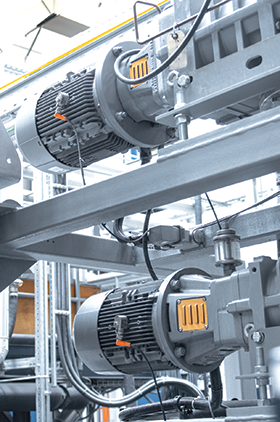

Drinking bottles, food packaging, bags, toys: many things in everyday life are made of plastic – but we only need some of them for more than a few hours or days. Around 400 million tons of plastic are produced worldwide every year. Only a small share of this is recycled and thus reused. Among the players that keep the plastics cycle going and successfully complete it are the Austrian EREMA Group and PET-Verpackungen from Germany.
The EREMA Group is committed to giving plastics a new life. To this end, the company develops and produces plastics recycling systems and the associated solutions and services. The approximately 7500 active plants worldwide have the capacity to produce more than 20 million tons of recycled granulate.
“To produce the granulate, the plastic is delivered to the operators of our systems in the form of flakes, which are already shredded, clean and sorted,” says Florian Schieder from R&D; Management at EREMA. “The flakes are then dehumidified, compacted, melted, filtered and granulated in our plants. The granulate produced is the basis for reusing the recycled material to manufacture new plastic products.”
If food-grade granulate is to be produced, as is the case at PET-Verpackungen, for example, the flakes are shredded at a higher temperature and under vacuum. “On the one hand, this ensures that the material is decontaminated, and on the other hand, this special treatment enables us to achieve better colour properties for both the granulate and the end product,” Schieder continues.
With up to 80 vibration sensors per system, EREMA relies on sensor technology and IO-Link masters from ifm to control the manufacturing process. “We have been using pressure sensors, photoelectric distance sensors, and flow sensors for a long time to ensure that all relevant process values are adhered to, and that the material flow takes place at the required speed,” says project manager,
Yvonne Kappacher-Winter. “We are now digitalising our systems even further by equipping motors, gears, vacuum pumps and roots compressors with a total of up to 80 vibration sensors and other oil condition sensors. This enables us to record the system’s maintenance requirements precisely. The customer can see information on the health status of the system via our PredictOn predictive maintenance system both directly on the system and via our BluPort customer portal. This enables early damage prediction and the planning of appropriate maintenance measures to minimise downtimes,” she adds.
Digitalisation: everything from a single source
Schieder continues: “We have customers who operate their systems around the clock and produce up to six ton of granulate per hour. The long-term availability of our machines is becoming increasingly important for us and our customers. It was clear to us that we needed more sensor technology and further digitalisation in order to be able to detect and avert impending failures at an early stage. We needed a strong partner who could support us with the right products and expertise in vibration analysis. At ifm, we receive everything from a single source, from the sensor to the evaluation electronics, IO-Link master and gateway. This makes it easy for us to offer the customer a seamless solution. They can see the processed data on their laptop and smartphone at any time and take appropriate action, including ordering spare parts from us.”
Containers made from 100% recycled material
PET-Verpackungen also appreciates this data-based maintenance planning. As part of the Wiegand Glas Group, the company primarily produces PET preforms for the beverage industry, but also moulded PET containers with a capacity of 10 millilitres up to 30 litres.
“The topic of recycling is becoming more and more important for us. Our customers are increasingly asking for products made from recycled materials. In some cases, the proportion is 100%,” says Matthias Raab, operations manager at PET Packaging. “That is why we decided to commission our own recycling plant three years ago, and chose EREMA as our technology partner.”
PET-Verpackungen produces up to 50 tons of granulate every day for further processing. “In order to maintain the production process, it is important that all systems and processes function reliably. The digitalisation solution from EREMA supports us enormously here, as the condition monitoring and planning of maintenance is considerably simplified by the data provided,” says Raab.
Conclusion
With integrated solutions for digitalised, comprehensive system monitoring, ifm helps EREMA to offer its customers added value in the plastics recycling process. Thanks to condition-based maintenance, system availability is increased, and the recycling potential is maximised.
| Tel: | +27 12 450 0400 |
| Email: | [email protected] |
| www: | www.ifm.com/za |
| Articles: | More information and articles about ifm - South Africa |
© Technews Publishing (Pty) Ltd | All Rights Reserved